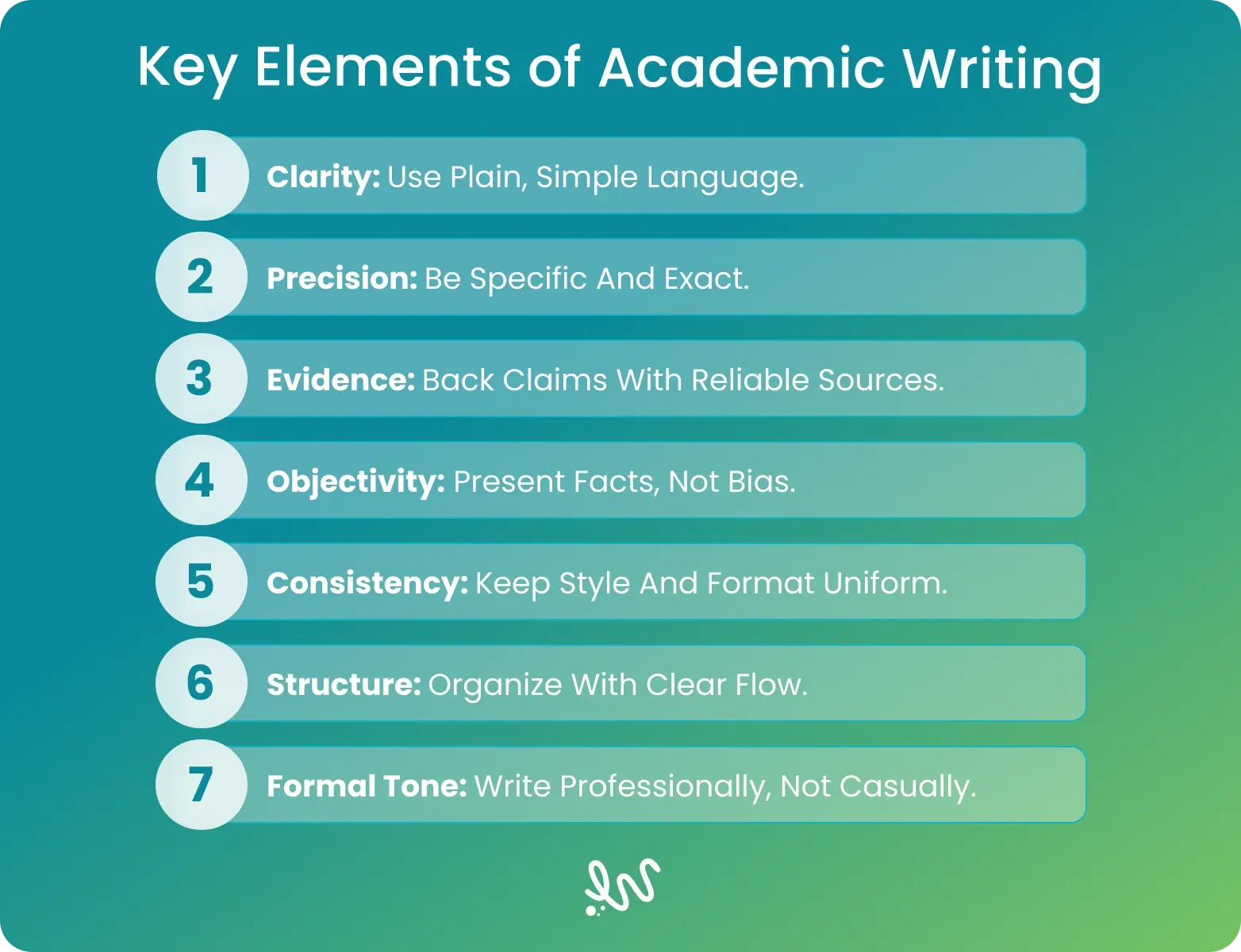Many university students struggle with academic writing. Sentences feel heavy, arguments lose focus, and feedback often highlights the same mistakes. A survey by the Association of American Colleges found that over 60% of professors rank poor writing as the top barrier to student success. Strong ideas fall flat when the writing is unclear.
There are lots of ways to improve writing skills for students, and in this guide, we have broken down the best options for you to consider. After all, improving your writing is not only about grammar. It requires a focus on studying, structure and the ability to connect with your reader.
Meanwhile, remember that WME connects you with experts for refining essays and giving practical support. Instead of losing marks for weak expression, with us you can learn how to deliver strong work with confidence!
Can't Catch Up with the Deadlines?

Key Elements of Academic Writing
Good writing depends on structure and discipline, and these elements guide you toward that goal.

- Clarity: Write in plain language. Avoid jargon unless your audience requires it. Replace long phrases with shorter ones. For example, use "because" instead of "due to the fact that."
- Precision: Be specific with claims. Numbers, dates, and direct references strengthen arguments. Saying "surveys show 62% agreement" is more credible than "most people agree."
- Evidence: Support all claims with reliable sources. Prioritize peer-reviewed journals, official reports, or primary data. Unverified sources weaken your argument.
- Objectivity: Present facts before opinion. Use evidence to guide conclusions instead of personal bias. Avoid emotional or persuasive wording.
- Consistency: Follow the required citation style. Keep formatting uniform across references, headings, and tables. Small inconsistencies reduce professionalism.
- Structure: Organize content with clear introductions, body sections, and conclusions. Use transitions to guide readers. A logical flow ensures ideas build on each other.
- Formal Tone: Avoid casual expressions. Write with respect for the academic audience. Direct, professional tone builds credibility.
How Can Academic Writing Be Improved
Now, let's get into the interesting part where we explain how you can be better at academic writing. You already know at this point that steady practice and focused techniques are what improve your skills. However, we have gathered further targeted steps that you can apply immediately.
Organize Your Ideas
Here's what you should know first: readers lose interest when ideas appear scattered. That's why you should start by grouping points before you write. Use outlines or numbered lists to decide the order. Place your strongest argument first, then follow with supporting points.
- Breaking large topics into smaller themes.
- Writing one key point per paragraph.
- Using transitions such as "for example" or "in contrast" to guide flow.
When you prepare the structure early, you reduce editing time. Clear organization also helps your reader remember your argument. Research from cognitive psychology shows that well-ordered content improves retention rates.
Target Your Reader
Depending on your audience, you must also adjust tone and complexity. An article for peers requires technical detail, while a class paper for a professor values accuracy and citations over style.
- What level of knowledge does my reader have?
- Do they expect technical language or plain explanation?
- What outcome do I want them to reach after reading?
Avoid assuming shared knowledge. If you write "PCR," explain the term if the reader is not a biology specialist. Your success depends on how easily the reader follows your reasoning, not on how complex the sentences appear.
Seek Feedback
Your own reading of a draft hides blind spots. Ask peers, mentors, or supervisors to read your work. They will spot gaps in logic, weak evidence, or confusing transitions.
- Exchange drafts with a classmate.
- Use structured rubrics for comments.
- Ask readers to mark where they lose focus.
Track recurring suggestions. If three people note that your conclusion feels weak, revise it. Research shows that academic writers who seek regular feedback improve twice as fast as those who work in isolation.
Write Consistently
You can't practice academic writing skills by only writing once a month. This creates gaps in skill development. Rather, consider daily practice to build fluency and reduce hesitation. Treat writing as a routine, not an occasional task.
- Set a daily word goal, even 150 words.
- Write at the same time each day.
- Keep a log to measure progress.
Small, repeated efforts compound. Over several months, your drafts will become clearer with less effort. This consistency also reduces anxiety before deadlines since writing feels familiar instead of forced.
Expand Your Vocabulary
A limited vocabulary restricts clarity. Broader word choice allows you to pick the most precise term instead of repeating generic words. Precision makes your argument sharper.
- Read academic articles in your field.
- Keep a personal glossary of useful terms.
- Practice replacing common words with field-specific ones.
Do not add words to appear sophisticated. Use them when they express your point more directly. For example, in sociology, "social stratification" communicates more than "class differences". A richer vocabulary gives you control, not decoration.
Read Regularly
You might feel like you already know how to write academically, but here's more: frequent reading sharpens your writing instincts. Exposure to academic texts teaches you how arguments are structured, how evidence is presented, and how tone is adjusted for formality. Reading outside your field also strengthens adaptability.
- Read at least one journal article per week.
- Annotate passages that show strong transitions.
- Compare how different authors explain the same concept.
By observing patterns, you absorb effective techniques without conscious effort. Over time, your own writing will reflect the precision and flow of the material you study. Research links regular reading with stronger technical writing, since you gain a mental library of phrasing and style.
Embrace Inclusive Language
Inclusive language avoids bias and broadens your audience. Academic work must respect diversity in gender, culture, and ability. Words shape perception, and exclusion weakens credibility.
- Replace "he" as default with "they."
- Use people-first terms like "students with disabilities" instead of labels.
- Avoid cultural assumptions when giving examples.
Inclusive writing reflects accuracy, since academic communities include varied identities. Many journals and universities require inclusive language guidelines. Applying these standards protects your work from criticism and ensures that your research remains relevant in a global context.
Eliminate Repetition
Repetition makes text heavy and slows comprehension. This is another one of our valuable tips for academic writing improvement. Remember, readers should not encounter the same idea stated in multiple ways without need.
- After drafting, highlight repeated words.
- Replace duplicates with synonyms or restructure sentences.
- Ensure each paragraph adds a new layer, not a rephrased old one.
For example, repeating "significant improvement" three times weakens the claim. Instead, state it once and show evidence. Precision replaces redundancy. A focused draft respects your reader's time and strengthens your argument.
Keep Writing Clear and Elegant
Clarity is the mark of strong academic writing. Elegance does not mean elaborate vocabulary, but sentences that flow with ease. Simple structure delivers complex ideas more effectively.
- Prefer short sentences with direct verbs.
- Cut filler words that add no meaning.
- Read your text aloud to hear if it drags.
A clear paragraph helps the reader retain more detail. Elegant writing is the product of restraint, where every word serves a purpose. Scholars value work that communicates ideas quickly, without unnecessary complexity.
Enhance Grammar, Punctuation, and Style
Errors in grammar or punctuation weaken trust. A strong paper depends on technical accuracy as much as on content. Correct usage also ensures smoother reading.
- Use grammar-check tools, but review results critically.
- Pay attention to common errors like subject-verb agreement.
- Learn rules for punctuation marks: commas, colons, and quotation marks.
Style improves through conscious editing. Vary sentence length to avoid monotony. Align with the required style guide, whether APA, MLA, or Chicago. A polished draft signals professionalism, and in academic contexts, that detail influences evaluation as much as argument strength.
Prefer Active Voice
Active voice makes writing direct and sharp. Sentences become shorter and easier to read. In academic work, this reduces confusion and shows accountability.
- Weak: "The experiment was conducted by the team."
- Strong: "The team conducted the experiment."
- Place the subject before the verb.
- Remove unnecessary helping verbs.
- Reread each sentence and ask who is acting.
Active voice reduces clutter. It improves flow and helps readers grasp your argument faster.
Craft a Strong Thesis with Evidence
A thesis without support is an opinion. Readers expect proof. A strong thesis is specific, arguable, and backed by data.
- State your main claim in one sentence.
- Add clear reasoning tied to research.
- Anticipate counterarguments and address them.
Example: Instead of writing "Climate change is harmful", write "Rising global temperatures increase food insecurity, as shown in UN agricultural reports." Strong evidence transforms your thesis into an argument that readers trust.
Skip Clichés and Extra Words
Clichés weaken writing, and extra words waste space. Academic readers expect precision, not filler.
- Replace phrases like "at the end of the day" with direct statements.
- Cut words that cannot be used in an essay and repeat the meaning, such as "absolutely essential."
- Remove unnecessary introductions like "It is important to note that."
Every sentence should advance your argument. Extra words dilute meaning and distract from the point.
Strengthen Sentence Structure
Varied structure keeps writing lively and clear. Repeated patterns bore the reader. Unbalanced sentences cause confusion.
- Mix short and longer sentences.
- Avoid starting every line with the same word.
- Use parallel structure for lists.
Example: "The study tested three groups, recorded the results, and analyzed the data" flows better than "The study tested three groups, the results were recorded, and the data was analyzed." Balanced sentences improve rhythm and precision.
Review Your Work
First drafts are never final. Careful review sharpens clarity and accuracy. You must look at both content and mechanics.
- Check if each paragraph supports the thesis.
- Remove redundant sections.
- Verify citations and references.
- Read aloud to catch awkward phrasing.
A thorough review prevents errors before submission. Strong editing signals respect for your audience and your own work.
Use Proofreading Tools
Proofreading tools highlight mistakes that escape your eye. They catch grammar slips, style issues, and spelling errors.
- Run your draft through grammar-check software.
- Review each suggestion; do not accept all blindly.
- Combine essay checker tools with manual checks for accuracy.
Tools like Grammarly or built-in checkers in Word and Google Docs save time. They do not replace your judgment, but they help polish your writing to professional standards.
Tackle Any Assignment with Confidence

Final Outlook
Improving academic English writing skills depends on discipline. Here's the recap of the most valuable tips you should keep in mind:
- Write with clarity and cut excess words.
- Support arguments with solid evidence.
- Read widely to sharpen style and vocabulary.
- Review and edit carefully before submission.
- Adjust tone and language for your audience.
If you need structured guidance along the road, WME provides support during studies. You can gain access to experts who help refine your skills and apply the principles discussed here!
FAQ
What is the Most Common Issue in Academic Writing?
Lack of clarity is one of the most common issues in academic writing. That's because writers often overload sentences with filler and lose the main point.
Why is Writing So Hard for Some Students?
Because they skip planning, without outlines or goals, writing feels chaotic. Consistency solves this.
Does Reading Make Writing Easier?
Yes. Regular reading gives you models for structure, vocabulary, and tone. Frequent exposure builds stronger writing habits.
Sources
Problems in Students’ Academic Writings. (2020). Journal of Education and Practice. https://iiste.org/Journals/index.php/JEP/article/view/53239
AlMarwani, M. (2020). Academic Writing: Challenges and Potential Solutions. https://papers.ssrn.com/sol3/DisplayAbstractSearch.cfm. https://papers.ssrn.com/sol3/papers.cfm?abstract_id=3675952
University Libraries Publishing through the eLearning Support Initiative. (2015, January 2). 8.1 What’s Different about College Writing? — College Success. College Success. https://psu.pb.unizin.org/orientationsu18/chapter/8-1-whats-different-about-college-writing-college-success/



